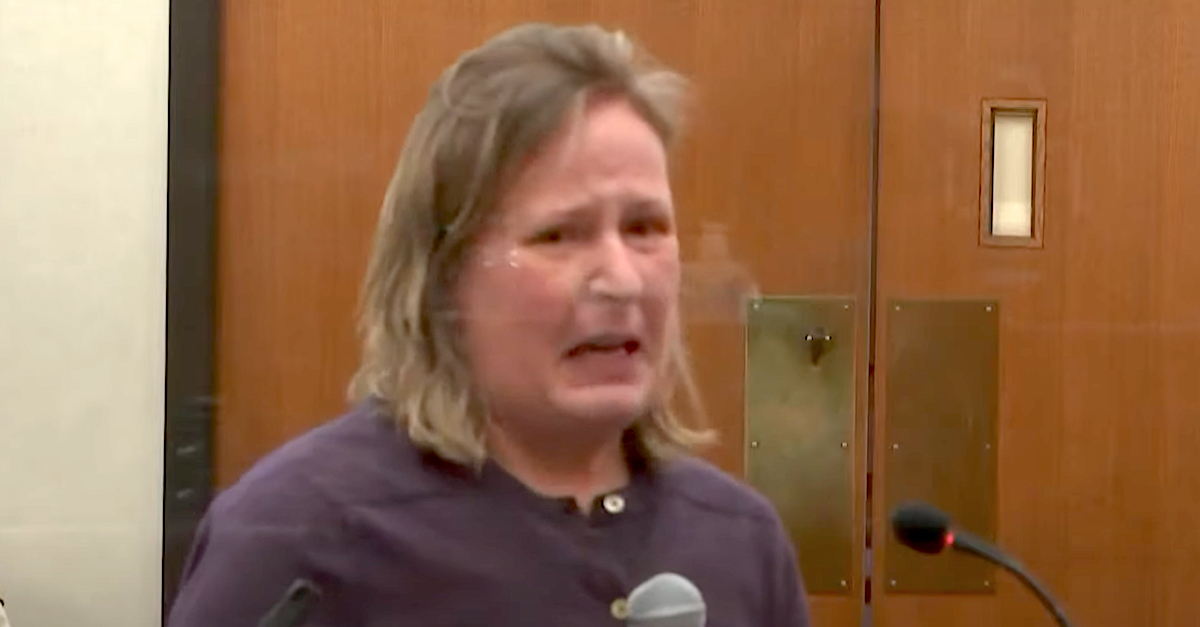
Kimberly Potter speaks to the court shortly before sentencing on Feb. 18, 2022. (Image via the Law&Crime Network.)
Kimberly Potter, the former Brooklyn Center, Minn. police officer convicted of manslaughter in the shooting death of Daunte Wright, 20, has been sentenced to 24 months — but only some of that time will be served in prison.
Judge Regina M. Chu said Potter would be required to serve 16 months behind bars — that’s two-thirds of the sentence — and the remaining one-third on supervised release. Potter will also be fined $1,000, be forced to pay additional assessments, and cannot use firearms or explosives. Potter is receiving credit for 58 days already served.
Potter, then 49, shot and killed Wright during a catastrophic April 11, 2021 traffic stop. A Hennepin County jury found Potter guilty of both first-degree manslaughter and second-degree manslaughter a little more than eight months later on Dec. 23, 2021.
Judge Chu noted at the commencement of the sentencing that the second-degree manslaughter conviction would roll into the first-degree manslaughter conviction for the purpose of sentencing. Therefore, the 41- to 57-month guideline sentence for second-degree manslaughter would be subsumed into the 74- to 103-month guideline sentence for first-degree manslaughter.
Prosecutors originally asked for an upward sentencing departure — something more serious than the guidelines contemplated — but ultimately asked the judge to sentence within the guidelines.
The defense asked for a stayed prison sentence — in other words, probation with no time behind bars. Or, in the alternative, the defense asked for a downward departure below the range contemplated within the guidelines.
“We have to say his name,” Assistant Attorney General Matthew Frank said while articulating Wright’s name. “He was not just a driver, he was a living human being — a life.”
“The highest principle of law enforcement is the sanctity of life, and his life counted,” Frank continued. “His life mattered. And that life was taken, and the law recognizes the severity of the loss of life.”
Frank said that Potter’s crime was not intentional but rather that Potter was “culpably negligent.”
Victim Impact Statements
Katie Ann Wright, the victim’s mother, called Daunte her “baby boy.”
“He will always be my son, and I’m proud to say that,” the mother said.
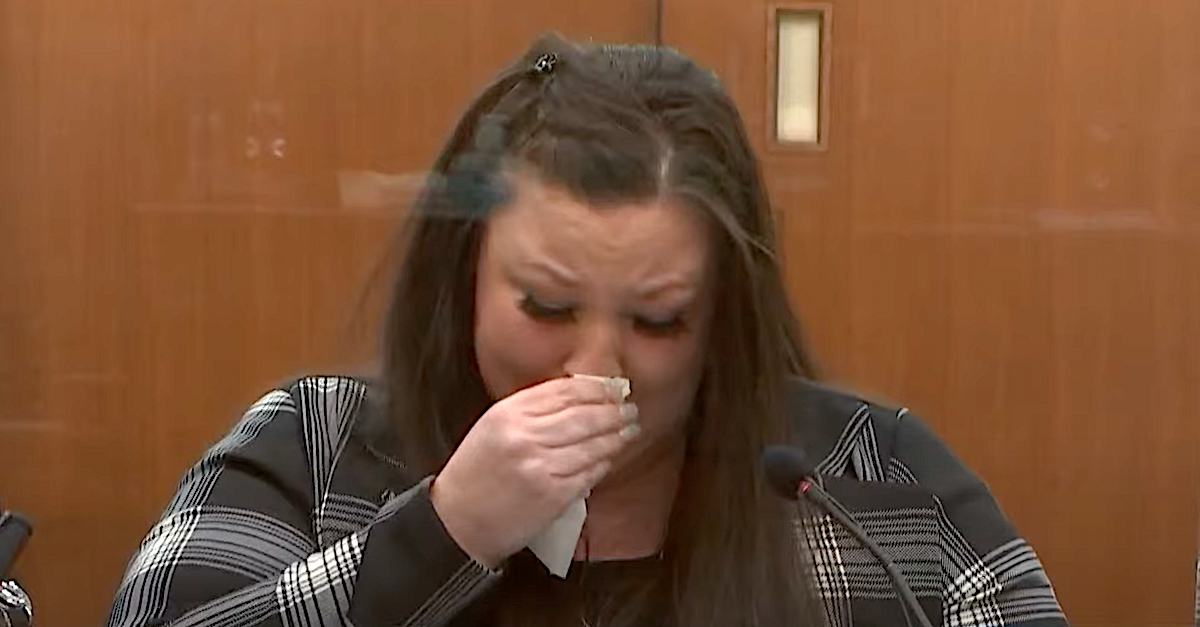
Katie Wright. (Image via the Law&Crime Network.)
Katie Wright refused to call Potter by her name. She referred to her only as “the defendant,” she said, because Potter referred to Wright as “the driver” in an attempt to “dehumanize” him.
“And for that, I will never be able to forgive you,” Katie Wright said with reference to Potter.
“A police officer who is supposed to serve and protect someone took so much away from us,” she continued through sobs. “She took our baby boy with a single gunshot through his heart, and she shattered mine.”
Daunte Wright’s mother also scolded Potter for failing to render immediate aid after pulling the trigger.
Saying that her world has been filled with “darkness and heartache,” Katie Wright continued. “Most of all, she took a father from his son.”
“I have to grieve in public,” she continued. “The whole world sees my crying face. It’s plastered all over. My shattered heart has been on display for almost a year now, and I have to live in this nightmare: watching my son shot and killed and over again. The defendant will be here to watch her sons marry, have children, buy a house, start a family. For me, every day, I could only hope to wake up and see Daunte walk through the door and watch him play with his son, mess with his sisters, laugh with his brothers — a hope that’s never going to come true.”
All of the relatives who spoke at the hearing consented to having their images shown on television, court records indicate.
“Your honor, I’m asking you to hold the defendant to the highest accountability,” Katie Wright added. “She was a person of authority who betrayed her badge not only when she shot Daute but when she rolled around on the ground crying for herself: ‘I’m going to prison, I shot a boy; call Chuck’ — her union rep — when she should in fact have said, ‘go save him; how is he doing; is he okay; please help him.’ She didn’t even try, your honor.”
Katie Wright then accused Potter of sitting through the trial “with entitlement and privilege” and of never attempting to console the grieving Wright family. She said Potter only showed sympathy after a break — and possibly after being coached. She then railed on Potter for smiling in a mugshot after conviction.

Kimberly Potter appears in a mugshot released by the Minnesota Department of Corrections.
Paul Engh, a defense attorney for Potter, later said Wright was “asked” by prison staffers to smile and blamed that alleged request for the contested mugshot. Engh said there was “no disrespect” intended — rather, it was a “response to the prison’s request,” he claimed.
Katie Wright also said she would “fight” until “driving while Black” was no longer a “death sentence” and asked the judge to consider Potter as unrepentant and smug when ascertaining a sentence.
Arbuey Wright, Daunte’s father, described his “powerful and deep” love for his son while sharing anecdotes about the victim’s life growing up.
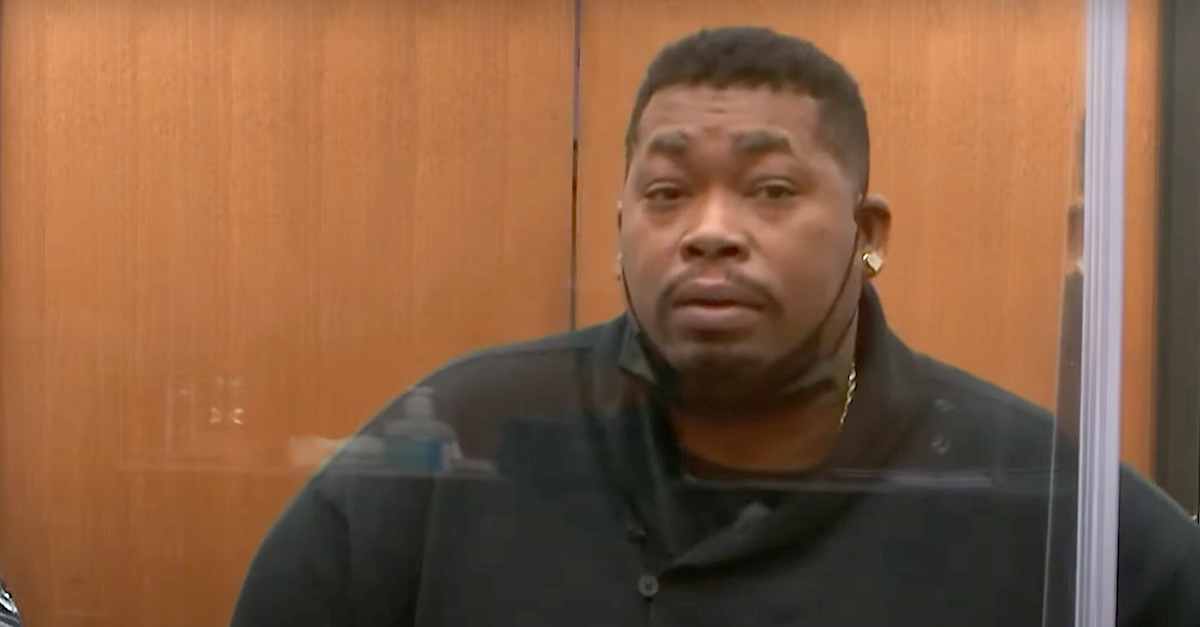
Arbuey Wright. (Image via the Law&Crime Network.)
Damik Bryant, Daunte Wright’s brother, described life without Daunte as “miserable.”
Diamond Wright, Daunte’s sister, said she had to “see her brother in a metal container” due to Potter’s conduct.
“Everyone just sees this as another Black man being killed by the police,” Diamond Wright continued. “But not us. This one hit home. This time it was one of us.”
She then recalled discussing the death of George Floyd, Jr., with Daunte.
“Me, my mom, and Daunte were having a talk, saying just maybe we have just enough white in us for us not to be a threat to the police,” Diamond Wright continued. “We were wrong. We are repeatedly seeing that one hint of Black in our skin makes us a target. This is sickening.”
Chyna Whitaker, the mother of Daunte Wright’s son, said she worried that her son would grow up unable to trust the police.
“I don’t want my son to grow up afraid of the police or hating them,” Whitaker said. “Nevertheless, it’s only fair that Kim Potter be sentenced to the maximum amount of time.”
Defense Arguments
Defense Attorney Engh countered in part with a legal argument about what sentence was appropriate — but he then brought out one of three alleged boxes of fan mail Potter heretofore received behind bars. One of those letters and cards, allegedly from a police officer in another part of the North Star State, said that what happened to Potter could happen to “any of us.”
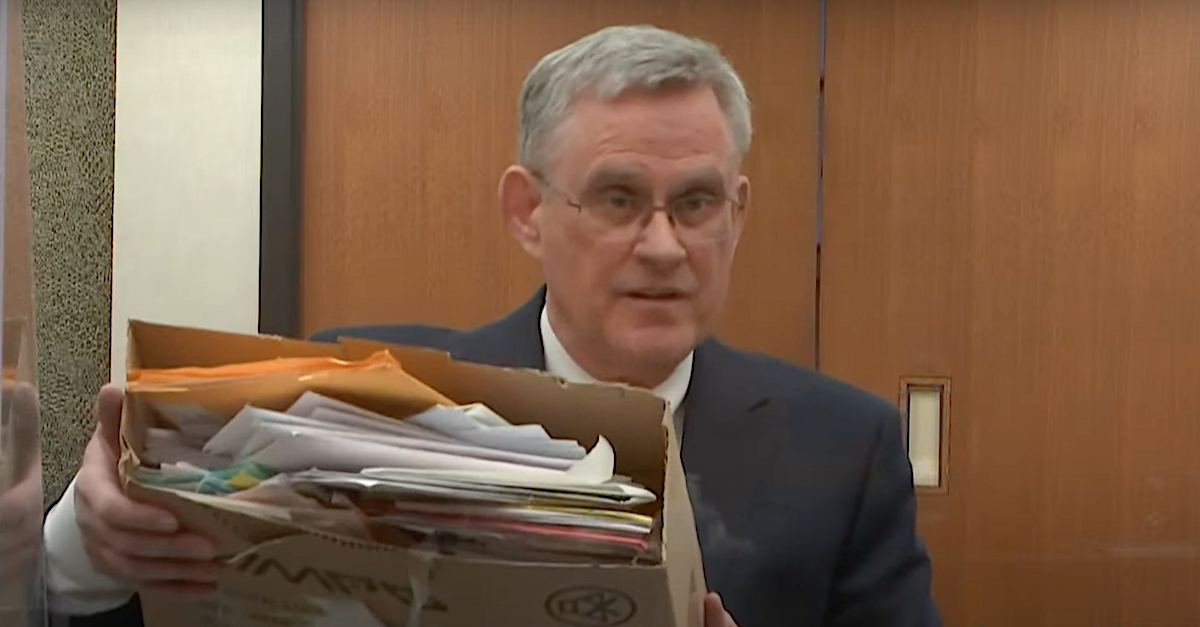
Defense attorney Paul Engh showed the court one of three alleged boxes of letters of support that Kim Potter received while in jail. (Image via the Law&Crime Network.)
“You have an amazing community behind you,” another letter said. “You make the world a better place.”
Another, allegedly written by the wife of a retired state trooper, pointed to the “agony of split-second decisions.”
Engh said the cards came from “all over the country” and even from “Europe” and promised that Potter would respond to them. He also offered to put the cards on the court record in Potter’s support.
Engh also said observers “can’t engage in psychoanalysis” in attempting to ascertain whether Potter was truly remorseful. He said Potter would “never” be able to meet the public’s — or the state’s — demanded “standard” of remorse.
The defense attorney further argued that prison would be harmful and perhaps dangerous for Potter — a client who spent her career putting people in prison. Engh said Potter was in isolation and was being checked every 30 minutes by a guard. He said that the isolation resulted in a deterioration of Potter’s “physical and mental” health.
“It is harming her,” Engh said. “If you send her to prison, you will harm her. We are not in the business of harming defendants.”
The defense attorney then showed the court a stack of letters of support for Potter. He said he hoped the letters would convince the judge to “give her a break.” Some were colleagues or emergency medical technicians who worked with Potter.
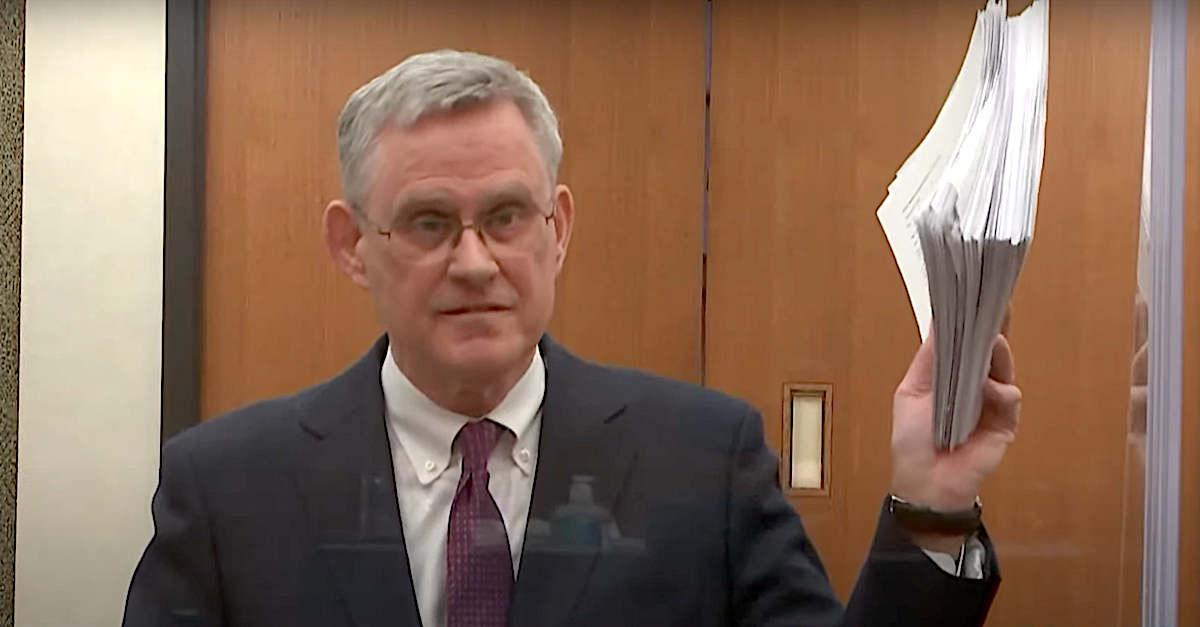
Defense attorney Paul Engh showed the court letters of support for Potter. (Image via the Law&Crime Network.)
“She genuinely cares for everyone she meets,” one letter said of Potter. It was written by someone who was allegedly suffering from PTSD. “We would check in on one another and offer a smile.”
“She is an incredible officer as well as person,” that letter continued, according to Engh. “The world would be an amazing place if everyone subscribed to be even half the person she is.”
Engh noted that the system was “adversarial” and that he was “duty bound” to advocate for Potter — included a lesser sentence. He said, as if to address observers, that he meant no “disrespect.”
He then recounted Wright’s allegedly “violent” and “aggressive” acts toward Potter and fellow officers.
The state said Wright “simply” tried to get away from Potter and was “not combative.”
“We beg to differ,” Engh said. “That’s inconsistent with the record.”
The defense attorney then cited testimony from fellow officers that the situation was, indeed, dangerous.
“The facts show the victim, Mr. Wright, was the aggressor,” Engh said during an argument for a downward departure in the sentence.
“Her intended response,” Engh said, “was to use the Taser.”
The gunshot, he recounted, was a mistake.
The defense then read the usual letters from Potter’s family, called for “mercy and forgiveness,” and said that if the court wished to help defendants, it would help Potter.
The judge called a fifteen-minute break before the proceeding resumed.
Potter’s Trial
There was never any dispute that Potter killed Wright. The question for jury was the level of legal culpability — if any — that would attach to the incident.
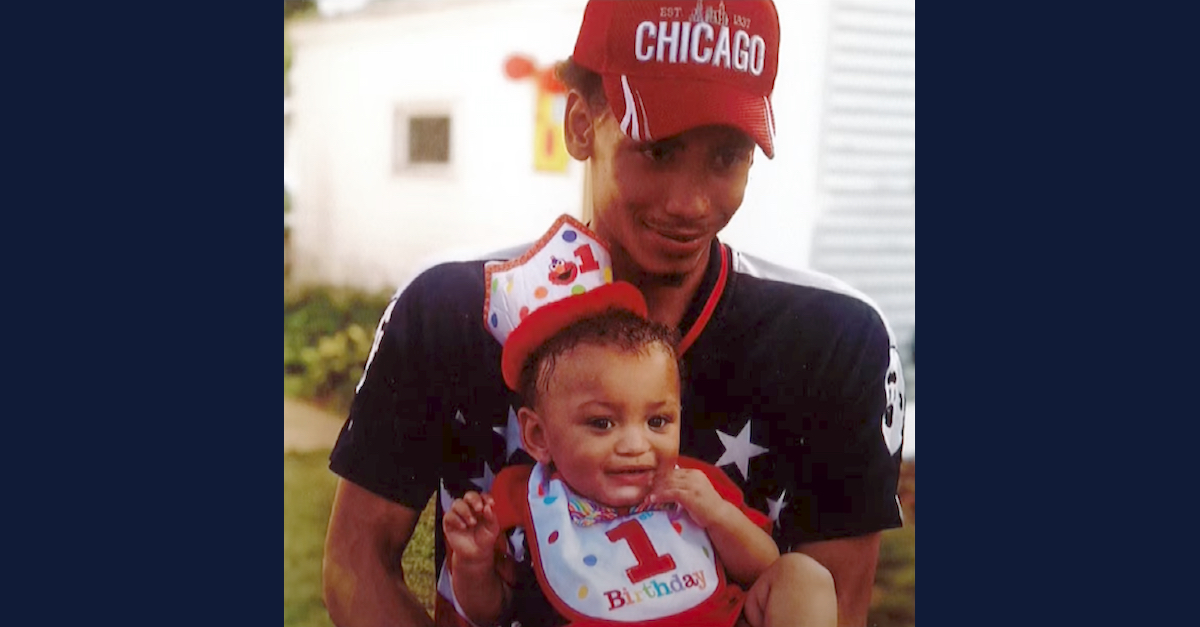
Prosecutors showed an image of police shooting victim Daute Wright during opening statements in the trial of ex-Brooklyn Center, Minn. Officer Kimberly Potter on Dec. 8, 2021. (Image via a slide used during prosecution opening statements.)
Police body camera video showed Wright beginning to resist Officer Andrew Luckey’s attempt to arrest him on a misdemeanor warrant during the stop. Wright got back into the driver’s seat of his car. Sgt. Mychal Johnson grabbed Wright’s right arm in an attempt to prevent him from speeding off. Potter pulled her gun but identified it repeatedly as a Taser. After yelling that she would Tase Wright, Potter pulled the trigger of her service weapon and shot Wright in the chest. The dying man, who prosecutors said was struck in the heart, drove off and crashed a short distance down the street.
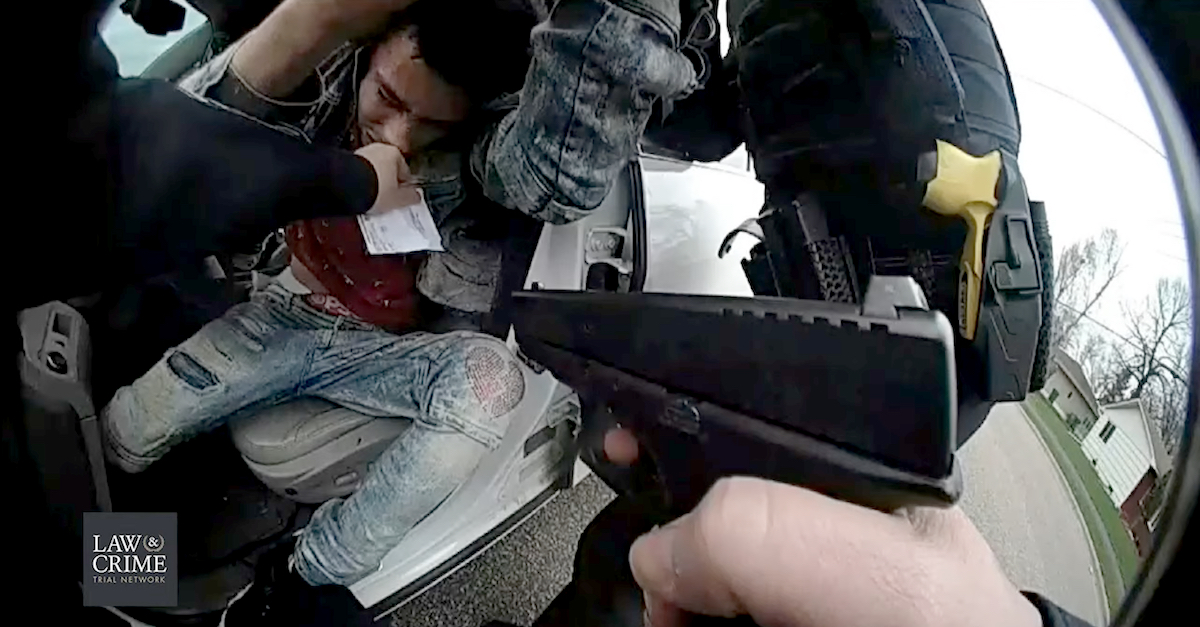
A still frame presented by prosecutors to a jury on Dec. 8, 2021, shows Kimberly Potter shooting and mortally wounding Daunte Wright. (Image via a slide used during prosecution opening statements.)
Potter’s gun was so close to Luckey that the shell casing struck him in the face, Assistant Attorney General Erin Eldridge told the jury during Potter’s trial.
According to the body camera video, Potter immediately recognized her fatal error.
“I grabbed the wrong fucking gun!” she screamed out. “I shot him! Oh, my God! Oh, my God! Oh, my God! Oh, my God!”
Potter resigned soon after the shooting.
The ensuing investigation noted that Potter should have known she was drawing her gun instead of her Taser because she kept her gun near her dominant hand — her right hand — and didn’t cross-draw the Taser from the other side of her duty belt.
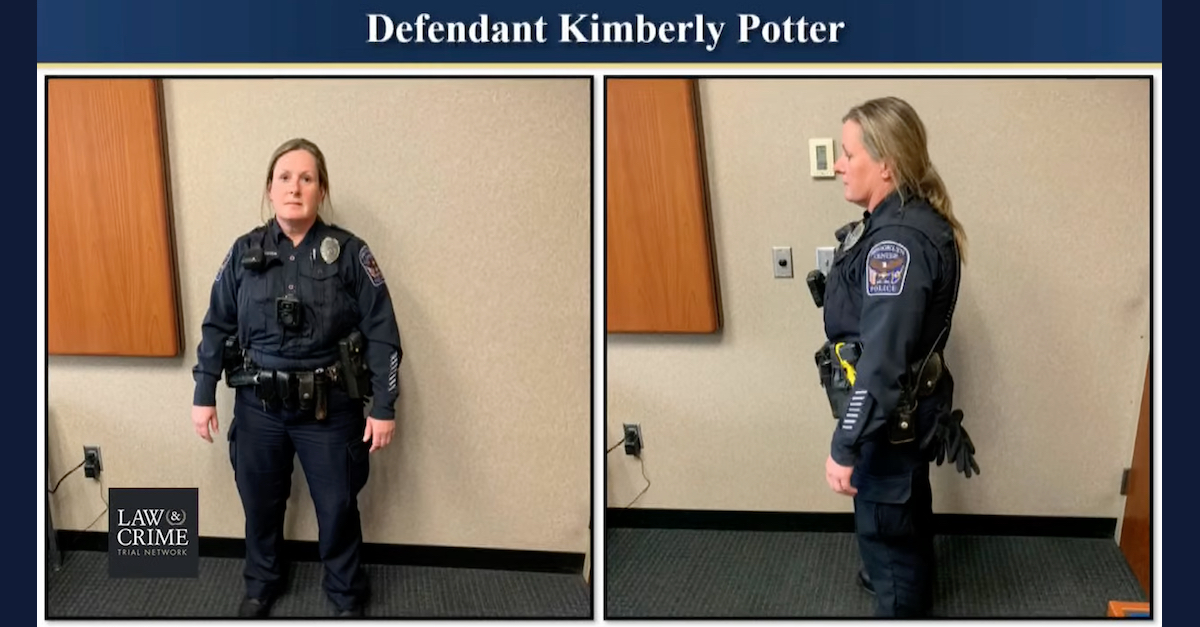
Two images show Kimberly Potter wearing her service belt. (Image via a slide used during prosecution opening statements.)
During Potter’s trial, defense attorney Earl Gray unsuccessfully attempted to convince jurors that Wright caused the confrontation that led to his own death by resisting the assemblage of officers and putting those officers in danger by his own attempts to flee.
The defense argued that Wright could have dragged and seriously injured Johnson, whose hand and arm were in the car during Johnson’s attempt to prevent Wright from fleeing. Johnson articulated that concern on body camera video shortly after the shooting; prosecutors countered that he was trying to cook up an excuse in an attempt to cover for Potter.
Gray acknowledged that Potter made a mistake by pulling her gun from the right side of her duty belt rather than her Taser from the left side of her duty belt. However, he said that Potter could not have recklessly handled a gun under Minnesota law because she did not know she was holding a gun. The defense also said Potter and the other officers had a legal duty to take Wright into custody under the warrant. Refusing to do so, or simply letting him go for the minor traffic offense which led to the stop, would have been direct defiance of the judge’s warrant.
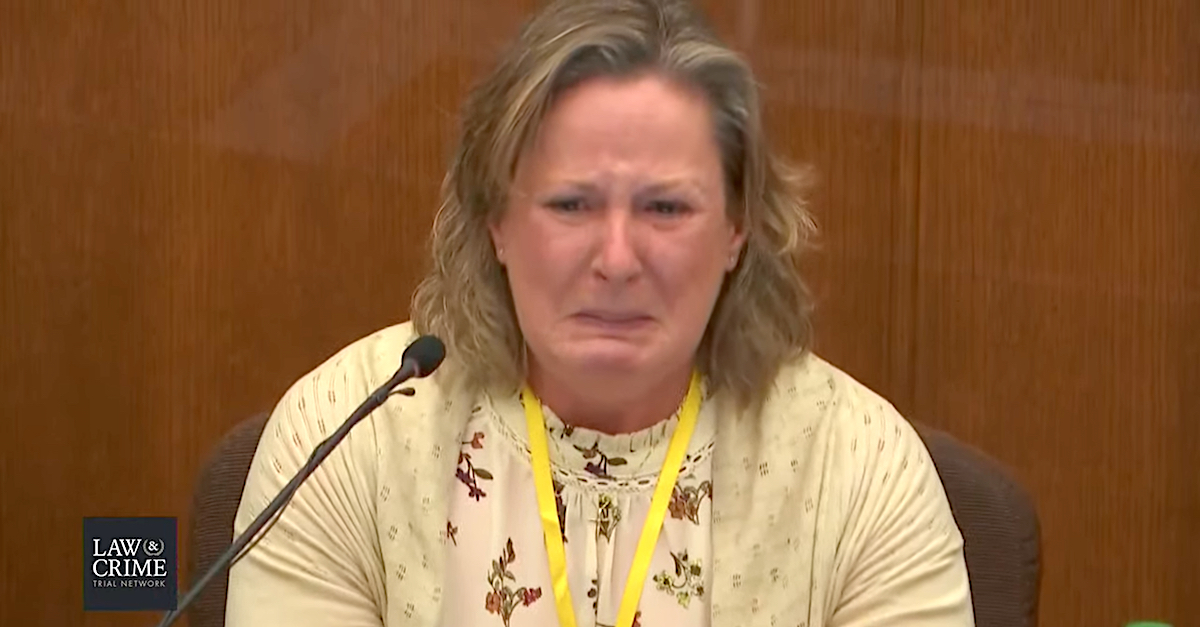
Former Brooklyn Center police officer Kimberly Potter cries on the witness stand on Dec. 17, 2021. (Image via the Law&Crime Network.)
Potter testified that she couldn’t remember most of the aftermath of the shooting because she was in shock.
When she was repeatedly berated by prosecutors for sitting on a curb crying rather than immediately rushing to attempt to aid Wright, Potter broke down on the stand and cried.
She said she didn’t remember any of what she said on body camera video after the shooting.
“I’m sorry it happened,” a sobbing and quivering defendant blurted out from the witness stand. “I’m so sorry.”
The overarching theme of the prosecution’s case was that Potter had been entrusted to perform a sobering and important civic duty and that she had failed at that task.
Potter Speaks
After court resumed, Potter spoke directly to Wright’s family.
“To the family of Daunte Wright, I am so sorry that I brought the death of your son, father, brother, uncle, grandson, nephew, and the rest of your family,” the defendant said.
She continued as follows. Please forgive any minor transcription errors due to Potter’s sobbing:
Katie, I understand a mother’s love, and I am sorry I broke your heart. My heart is broken for all of you. Earlier when you said that I didn’t look at your during the trial I don’t believe I had a right to. I don’t even have a right to be in the same room as you. I am so sorry that I hurt you so badly. My heart is broken and devastated for all of you. I pray for Daunte and all of you many, many times a day. He is not more than one thought away from my heart, and I have no right for that — for him to be in my heart. But I do pray that one day that you can find forgiveness only because hatred is so destructive to all of us and that I pray he shall always be with you and your family. I am so sorry. And to the community of Brooklyn Center, I do owe you an apology, too. I loved working for you. And I am sorry what has happened to our community since the death of Daunte. And the men and women who work for you still are good, honorable people who will work hard for you.
Watch Potter’s statement here via the Law&Crime Network:
The Sentence
After hearing from Potter, Judge Chu called the case “one of the saddest” she’s seen in twenty years on the bench.
“On the one hand, a young man was killed, and on the other, a respected 26-year-veteran police officer made a tragic error by pulling her handgun instead of her taser,” the judge said.
“I have been profoundly moved by the comments of the Wright family,” the judge continued. “I cannot begin to understand the grief of losing a child. I’m so sorry for your loss.”
Chu then said Potter “honorably served” for 26 years as a “respected officer” who “consistently went over and above the call of duty.”
The judge said she also directly received “hundreds and hundreds of letters” in support of Potter from colleagues and strangers.
“I read them all,” Chu said. “They paint a portrait of a woman who touched a lot of people in a good way.”
Chu said the state failed to prove several aggravating factors that would support a more severe sentence. She cited examples of cases that did support heightened sentences and said this case as nothing like those cases.
Chu agreed that other officers could have been “dragged and seriously injured” by Wright’s attempt to flee.
“There is no question that Ms. Potter is extremely remorseful,” Chu said. “This has been an extremely difficult decision.”
The judge said incapacitation — the prevention of future crimes — was not an issue here since Potter was not at risk of committing additional crimes. Nor did Potter need to be deterred from committing additional crimes.
“Kimberly Potter does not present a danger of future crimes,” the judge said.
Nor was rehabilitation a need.
“Ms. Potter does not need rehabilitation to become a law-abiding citizen,” the judge concluded.
The only reason for jail time would be punishment, Chu said.
“A downward durational departure is justified if a crime is less onerous than typical,” Judge Chu said. “I find the facts and circumstances here justify a downward departure from the guidelines.”
Chu rationed that Potter’s conduct “was significantly less serious than your typical manslaughter case” and said “everybody agrees” that “Potter never intended to use her firearm.”
The judge also said the scene was “chaotic” and “evolving,” facts that mitigated her culpability.
“This is a cop who made a tragic mistake,” Chu said while directly distinguishing the case from the Derek Chauvin case — noting that Potter’s was not a case of kneeling on a man’s neck for nine minutes, even as he was unresponsive in the street.
In what she called “a few parting comments,” Judge Chu said she didn’t wish to “diminish Daunte Wright’s life” by granting a more lenient sentence.
“His life mattered,” Chu said. “To those who disagree and feel a longer prison sentence is appropriate, as difficult as it may be, please try to empathize with Ms. Potter’s situation.”
Chu then quoted Barack Obama: “learning to stand in somebody else’s shoes, to see through their eyes, that’s how peace begins, and it’s up to you to make that happen. Empathy is a quality of character that can change the world.”
Officer Kimberly Potter was trying to do the right thing. Of all the jobs in public service, police officers have the most difficult one. They must make snap decisions under tense, evolving, and ever-changing circumstances. They risk their lives every single day in public service.
Chu then became emotional herself and at one point appeared to wipe away a tear.
“Officer Potter made a mistake that ended tragically,” the judge said in conclusion. “She never intended to hurt anyone. Her conduct cries out for a sentence significantly below the guidelines.”
Watch Judge Chu deliver the sentence below:
[images as noted]